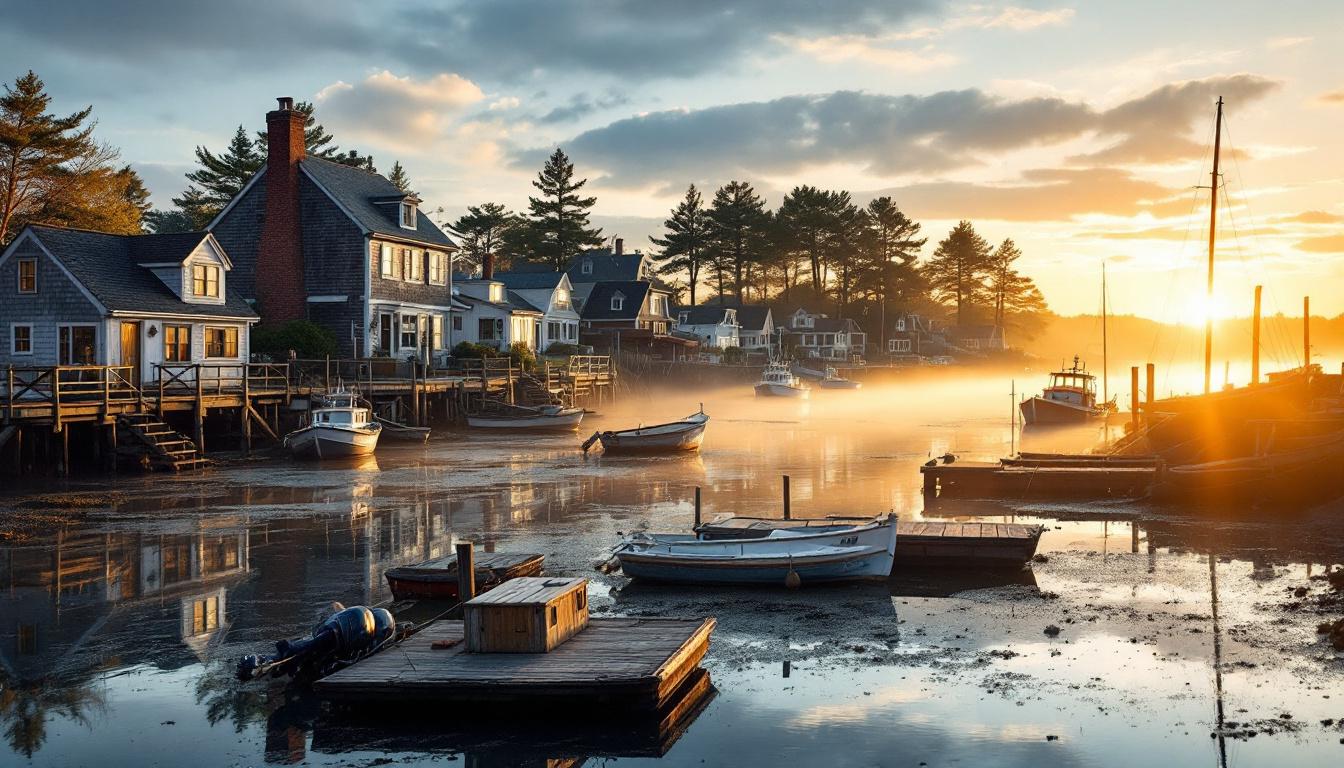The fog lifts from Wellfleet Harbor at dawn, revealing what 3,597 residents have quietly protected for generations. While tour buses thunder toward Provincetown and ferries shuttle crowds to Martha’s Vineyard, this Cape Cod village maintains its authentic rhythm through careful stewardship and gentle resistance to mass tourism.
Local shellfish constable Nancy Civetta patrols these waters with the dedication of a cultural guardian. “We’ve seen what happens to places that lose their soul,” she explains, watching sunrise illuminate the oyster beds that have sustained families here since the 1600s.
The numbers tell the story locals prefer to keep quiet: 70% protected land, median home values that reflect desirability without encouraging development, and a population that actually declined by 0.42% as surrounding Cape towns exploded with vacation rentals and chain restaurants.
The conservation strategies that preserve authenticity
Land protection through community action
Wellfleet’s secret weapon isn’t tourism boards or marketing campaigns—it’s the Wellfleet Conservation Trust and similar organizations that have quietly secured conservation easements on nearly half the town’s footprint. These aren’t government mandates but neighbor-to-neighbor agreements that prioritize osprey nests over oceanfront McMansions.
Zoning that favors character over commerce
While nearby towns debate hotel developments and shopping complexes, Wellfleet’s Local Comprehensive Plan maintains strict density limits and architectural guidelines. The result? Commercial Street still looks like a working fishing village, not a theme park version of New England.
How residents manage tourism without destroying community
The gentle art of natural crowd control
Notice how Route 6 bypasses downtown Wellfleet? That’s intentional. Visitors must make deliberate turns down narrow roads lined with conservation land, naturally filtering out casual traffic while welcoming those genuinely interested in the community’s offerings.
Supporting businesses that serve locals first
The Wellfleet Marketplace and Hatch’s Fish Market thrive because they serve year-round residents, not just summer visitors. This economic foundation allows authentic businesses to survive shoulder seasons while maintaining reasonable prices that don’t price out working families.
The oyster industry as cultural preservation
Multi-generational aquaculture keeping traditions alive
The Pontius, Bogan, and other oyster farming families represent living history—their grants and techniques passed down through generations create both economic stability and cultural continuity that resort development could never replicate.
Sustainable practices that protect the harbor
Wellfleet’s shellfish management program requires permits for recreational harvesting and strictly monitors water quality. These aren’t tourist restrictions but environmental stewardship that ensures the harbor remains productive for both visitors and residents.
Why this model works when others fail
Demographics that support long-term thinking
With a median age of 55.7 years and household incomes averaging $114,000, Wellfleet residents have both the stability and resources to choose preservation over quick profits from overdevelopment.
Seasonal rhythms that balance access with protection
Summer brings necessary tourism revenue, but the population naturally contracts each September, allowing the community to restore itself. This breathing pattern prevents the year-round congestion that has overwhelmed other coastal destinations.
Frequently asked questions about visiting responsibly
How can visitors support local conservation efforts?
Buy oysters directly from local farms, shop at businesses owned by year-round residents, and consider visiting during shoulder seasons when your dollars have maximum impact without straining infrastructure.
What should tourists know about shellfish regulations?
Recreational shellfishing requires permits and knowledge of closed areas. The shellfish constable’s office provides current regulations, but respect that this is working waterfront, not a tourist activity.
Are there accommodations that align with community values?
Choose locally-owned inns and B&Bs over chain hotels, and book directly rather than through platforms that encourage short-term rental conversion of year-round housing stock.
Wellfleet proves that coastal communities can welcome visitors while protecting their essential character. The key lies not in keeping people away but in attracting those who value authenticity over amenities, culture over convenience.
Visit during October’s OysterFest when the community celebrates its maritime heritage, or arrive in early June when beach roses bloom along conservation trails. Come as a guest, not a conqueror, and you’ll discover why 3,597 residents guard this corner of Cape Cod so carefully.
